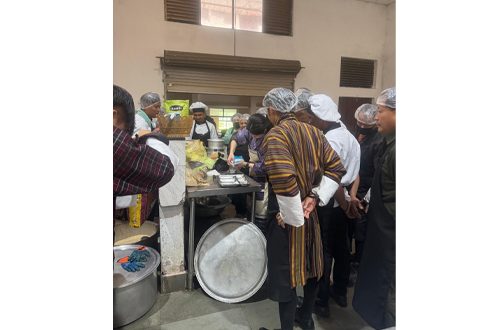Thousands of students and staff rely on meals served in institutional settings every day. For many, what is served in the college or school mess is not just a meal, it is their main source of daily nutrition.
Yet, institutional kitchens often prioritise quantity over quality, focusing on filling stomachs rather than meeting dietary needs.
Initiatives like the Food Security and Nutrition program at the College of Science and Technology (CST), supported by the Japan International Cooperation Agency (JICA), are therefore, crucial in shaping healthier futures.
The initiative brought together cooks and mess in-charges from CST, Gedu College, Kamji Central School, and nearby canteens. Participants did more than learn cooking techniques, they gained practical knowledge on planning and preparing meals that are nutritionally balanced.
At its core, the initiative recognizes that those who prepare food in institutions are silent influencers of health. By teaching them about portion balance, menu planning, and the use of local vegetables and meats, the program links everyday cooking with Bhutan’s broader goals of food security and healthy living.
The Secretary General of JAAB, Pema Gyalpo, emphasized the strategic importance of the initiative, saying “The program enables participants to plan and prepare meals that meet the nutritional requirements for a healthy body.” “It is about strengthening institutional meal planning processes and encouraging sustainable dietary practices within institutions,” he further said.
The initiative included hands-on sessions led by nutrition expert and JOCV volunteer, Minori Ohira, who demonstrated how small adjustments in preparation can make both vegetarian and non-vegetarian dishes nutritionally balanced.
Meanwhile, SAP Head at APD, Ministry of Agriculture and Livestock, B.B Rai, introduced the concept of “Nutri-Plants” and explained to the participants about how to select vegetables that enhance nutritional value.
This initiative highlights that a cook who understands nutrition imparts that knowledge through every meal served, influencing the health of hundreds of young people each day. Over time, improving institutional food quality reduces the risk of malnutrition, obesity, and other lifestyle-related illnesses.
According to JAAB, the implementation of sustainable dietary practices is essential for promoting long-term health and sustainability, even within limited financial resources. Moreover, participants learned cost-effective ways to source seasonal and local produce, reduce food waste, and use cooking methods that preserve nutrients, ensuring that both health and sustainability can be maintained despite budget constraints.
The CST-JICA initiative by investing in the capacity of institutional cooks aims to bridge the gap between policy-level discussions on food security and the actual meals served on students’ plates, translating vision into daily practice.
 The Bhutanese Leading the way.
The Bhutanese Leading the way.




